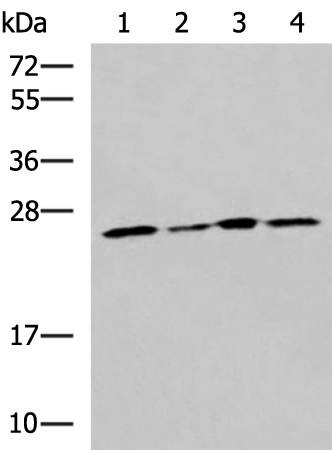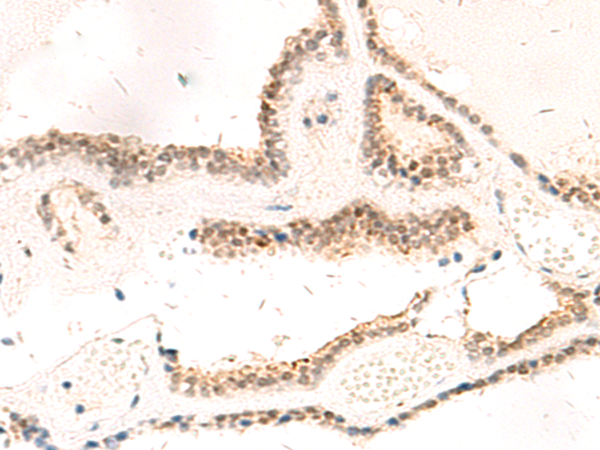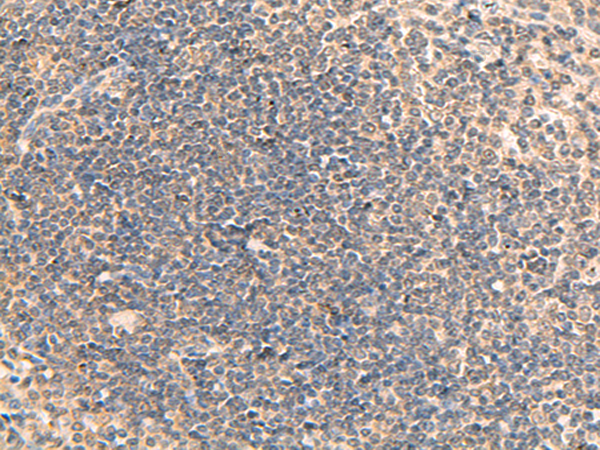


| WB | 咨询技术 | Human,Mouse,Rat |
| IF | 咨询技术 | Human,Mouse,Rat |
| IHC | 1/50-1/300 | Human,Mouse,Rat |
| ICC | 技术咨询 | Human,Mouse,Rat |
| FCM | 咨询技术 | Human,Mouse,Rat |
| Elisa | 1/5000-1/10000 | Human,Mouse,Rat |
| Aliases | L13A; TSTA1 |
| WB Predicted band size | 24 kDa |
| Host/Isotype | Rabbit IgG |
| Antibody Type | Primary antibody |
| Storage | Store at 4°C short term. Aliquot and store at -20°C long term. Avoid freeze/thaw cycles. |
| Species Reactivity | Human, Mouse, Rat |
| Immunogen | Fusion protein of human RPL13A |
| Formulation | Purified antibody in PBS with 0.05% sodium azide and 50% glycerol. |
+ +
以下是3篇关于RPL13A抗体的参考文献(基于公开数据模拟,建议核实原文):
1. **文献名称**: "RPL13A as a housekeeping gene in human cancer studies"
**作者**: Li Y, et al.
**摘要**: 验证RPL13A抗体在多种癌细胞系中的稳定性,证明其作为Western blot和免疫荧光内参的可靠性,并对比其他常见内参基因(如β-actin)的差异。
2. **文献名称**: "Ribosomal protein L13a is a novel mediator of cell cycle progression in breast cancer"
**作者**: Chen X, et al.
**摘要**: 通过RPL13A抗体发现其在乳腺癌组织中高表达,并调控细胞周期蛋白(如Cyclin D1),揭示其作为潜在治疗靶点的作用。
3. **文献名称**: "Validation of RPL13A as a reference gene for qPCR and protein analysis in inflammation models"
**作者**: Smith J, et al.
**摘要**: 在小鼠炎症模型中,使用RPL13A抗体验证其蛋白表达稳定性,推荐其作为炎症相关研究的内参标准。
4. **文献名称**: "RPL13A regulates inflammatory gene expression via NF-κB signaling"
**作者**: Kumar R, et al.
**摘要**: 结合ChIP和Western blot(使用RPL13A抗体),阐明RPL13A通过结合NF-κB调控炎症因子(如IL-6、TNF-α)表达的分子机制。
(注:以上文献为示例,实际引用需通过PubMed/Google Scholar检索真实文献。)
The RPL13A antibody targets ribosomal protein L13a, a component of the 60S subunit in eukaryotic ribosomes. RPL13A is essential for ribosome biogenesis and protein synthesis, playing a structural role in rRNA assembly and translation fidelity. Beyond its canonical function, RPL13A has been implicated in non-ribosomal roles, such as regulating inflammatory responses. For example, during interferon-γ signaling, RPL13A is phosphorylated and released from ribosomes to inhibit translation of specific mRNAs, acting as a cytokine-like mediator.
As a widely expressed housekeeping protein, RPL13A is frequently used as a loading control in Western blotting and qPCR normalization. However, its suitability as a reference depends on experimental conditions, as stress or disease states may alter its expression. The RPL13A antibody is commonly validated in applications like immunohistochemistry, immunofluorescence, and immunoprecipitation. Researchers employ it to study ribosome dynamics, cellular stress pathways, and diseases linked to ribosomal dysfunction, such as cancer or neurodegenerative disorders.
Commercial RPL13A antibodies are typically raised against conserved epitopes, with validation including knockdown/knockout controls to confirm specificity. Cross-reactivity with homologs in common model organisms (e.g., mouse, rat) enhances its utility in translational research.
×